A REVIEWER UNBURDENS HIMSELF. T HERE has probably been a book
called The Lone Trail, published by Whom-you-will, price 7s. 6d.
net. I am not reviewing it, nor can I have that book in mind, because I have never heard of it. I am reviewing Miss Flora Treherne Smith's novel. The name of her publisher is everyman's secret. I am free to write exactly what I like about this novel, because Miss Smith is blind and the publishers are unable to read. The Lone Trail is a bad novel, and it is typical of bad novels. Indeed, many of the phrases which will be quoted out of it are almost identical with phrases that I have found in other books.
• The dust cover represents a man in convict clothes. He is obviously a clergyman, because in his raised right hand he carries a crucifix, and his left is extended in benediction over the head of a kneeling woman, who is apparently dressed for the Opera. This scene takes place at the foot of a pine clad mountain that rises vertically up to the title, and is divided centrally by a narrow fawn line which I believe to be the lone trail itself. It is one of those dust covers which, besides supplying a pictorial key to the quality of the contents, try further to stimulate our interest by a somewhat biased review, usually printed on the inside of the flap. The Lone Trail is so reviewed as follows :— " Another enthralling story of the Virginia Mountains from the pen of this favourite authoress. Mavis Dalmahoy, the beautiful daughter of Silas K. Dalmahoy, the famous coal king and multi-millionaire, falls in love with her father's chief engineer, Bob Desmond. Silas is opposed to the match, and it is up to Bob to prove himself worthy of the hand of his daughter. Round Bob's effort Miss Smith has woven a thrilling drama of mystery and adven- ture that rings true to life in every page. There is a happy enough ending to this story of the old world town- ship of Silasville, and of the great silent mountains, whose quaint customs and traditions Miss Smith so faithfully represents. It is a story of deep human interest that cannot fail to have a wide popularity." I have read the book from dust cover to dust cover, and I am therefore able to tell you more about it than that. Mavis is indeed beautiful. Her long lashes sweep her velvet cheek and her chin has a firm " rondure." She is a "flower-like girl" who can yet, when occasion does not seem to demand it, exert " superhuman strength." "This delectable triumph of English Maidenhood" falls in love, as the dust cover said, with Bob, whom she meets in a motor accident. He is handsome, with curly hair but a rugged, determined appearance, a Mr. Owen Nares, "who has lived in the solitary places." The authoress insists on his reticence, but she cannot suppress him. "Strong and silent almost to the point of brusqueness" though he is reported to be, he continues to make verbose love to the heroine and to preach inter- minably to the villain. This villain, Denbigh Howard, is really Silas's enemy, but, as Bob so tactfully says in Silas's presence, "There is no man from manager to pit boy on the Silasville mine that will not take old Silas's enemy for his own." Bob acts upon this sentiment, and by frustrating Denbigh's cowardly attacks on the "mine (Denbigh is, of course, the son of "a rival interest ") at last earns the consent of Silas to his marriage with Mavis ; and then "they fared forth together, west, along the lone trail hand in hand, and the light of the Dawn was on their faces, and the light of fond dreams in their eyes."
But this is not all, for there is a moral in the story, a moral which is printed in italics, "A fallen woman is not fallen if there is a helping hand to help her." This is illus- trated in a by-plot. Bob has had, in the past, a liaison with a girl, but he forgives her when she confesses and begs the pardon of the clergyman who, to save her honour, has been condemned to penal servitude for a crime that was committed by—" whom but Denbigh Howard ? " That discovery, in the penultimate chapter, absolves Bob from the duty of murder, and Denbigh, when he has unravelled the mysteries that remain, "passed out of their lives, that he had striven so hard to wreck," into the hands of a patient detective. The no longer fallen woman marries the clergyman, "for she has always known as only love knows that he was good and brave and strong."
The modern bad novel does not usually " feature " a good clergyman. It is more popular to ridicule the church- goer and to endow the hero with "a deeper and truer religion than ever parson preached." The public insist on being taught the morals that they hold. Less than fifty years ago popular morals were different, and the moral of the bad novel was accordingly strictly orthodox. 'We have changed the fashion quickly. The authoress of Little Lord Fauntleroy is still alive.
The Lone Trail is an abomination. It is typical of the thousands of abominations that pollute the public taste. It should be burnt in Trafalgar Square and the authoress and the publisher hanged from the summit of the Nelson column as a warning to the hundreds of industrious authors who are writing similar books, and to the dozens of pub- lishers who are accepting them. You tell me the public demand them ? Rubbish ! I once lent a bricklayer's boy a copy of Chaucer, and he read it industriously. He liked the Miller's Tale best. You say there is no popular taste for good literature ? Rubbish again ! I have seen Aristotle exposed for sale on a street barrow in Shoreclitch.
A. B.



































 Previous page
Previous page